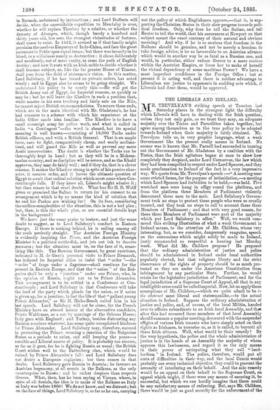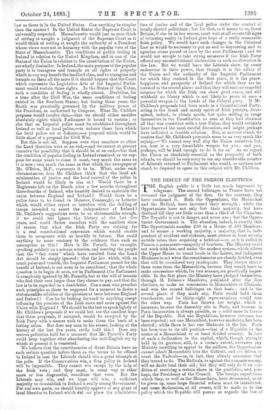THE LIBERALS AND IRELAND.
MR. TREVELYAN'S striking speech at Taunton last 1.11.. Saturday places in the strongest light the difficulty which Liberals will have in dealing with the Irish question, unless they not only gain, as we trust they ,may, an adequate majority over the Tories and Parnellites taken together, but agree among themselves as to the true policy to be adopted towards Ireland when their majority is fairly obtained. Mr. Trevelyan tells us, in very graphic language, what a weak Government like the present really means in Ireland. No sooner was it known that Mr. Parnell had succeeded in turning out the Government of Mr. Gladstone by a coalition with the Tories, than the Irish agitators began at once to show how completely they despised, under Lord Carnarvon, the law which they had been compelled to respect under Lord Spencer, and they made proclamation to Ireland of the fact in a very impressive way. We quote from Mr. Trevelyan's speech :—" A meeting near some evicted farms, for the purpose of intimidation,—a meeting which Lord Spencer had forbidden to be held,—was held. Five wretched men were hung in effigy round the platform, and from the platform three Members of Parliament violently denounced these men to the mob. Lord Salisbury's Govern- ment took no steps to protect these people who were so cruelly treated, and they took no steps to call to account these three Members of Parliament ; and that with very good reason, for these three Members of Parliament were part of the majority which put Lord Salisbury in office." Well, we would com- mend this striking illustration of what a weak Government in Ireland means, to the attention of Mr. Childers, whose very interesting, but, as we consider, dangerously sanguine, speech on the concessions which might safely be made to Ireland, justly commanded so respectful a hearing last Monday week. What did Mr. Childers propose He proposed that the ordinary administration of justice and police should be administered in Ireland under local authorities popularly elected, but that religious liberty and the strict observance of the rights of property should be as much pro- tected as they are under the American Constitution from infringement by any particular State. Further, he would retain for the legislative jurisdiction of Parliament, and for the legal jurisdiction of a Supreme Court of Appeal, all that in any intelligible sensecould be called imperial. Now, let us applythese conceptions of Mr. Childers,—which we quite admit to be in the abstract most liberal and statesmanlike,—to the actual situation in Ireland. Suppose the ordinary administration of justice and police, and, of course, of the local Militia, handed over to officers subordinate to an Irish local Assembly, and that after this had occurred three members of that local Assembly should summon a popular meeting, decorated with the suspended effigies of various Irish tenants who have simply acted on their rights as Irishmen, to terrorise or, as it is called, to boycott all these Irish citizens. Well, what would be their remedy? By the very hypothesis, the police and the whole administration of justice is in the hands of an 1 Assembly the majority of whom approve this lawlessness, and regard it as the only means in their power of extirpating what they call "land- lordism " in Ireland. The police, therefore, would put all sorts of difficulties in their way, and the local Courts would probably use every technical objection they could to prevent the necessity of interfering on their behalf. And the sole remedy would be an appeal on their behalf to the Supreme court, an appeal which might, if there were any means of securing it, be successful, but which we can hardly imagine that there could be any satisfactory means of enforcing. But, says Mr. Childers, there would be just as good security for the enforcementaf the
law as there is in the United States. Can anything be simpler than the answer? In the United States the Supreme Court is universally respected. Massachusetts would just as soon think of setting at naught a judgment of the Supreme Court as it would think of setting at naught the authority of a President whose views were not in harmony with the popular vote of the State of Massachusetts. The conditions of public feeling in Ireland in relation to the United Kingdom, and in one of the States of the Union in relation to the constitution of the Union, are wholly dissimilar. In Ireland, the main purpose of the popular party is to transgress and trample on all rights of property which in any way benefit the landlord class, and to transgress and trample on them all the more if it should happen that the Court which represents the Legislative Acts of the Imperial Parlia- ment would sustain those rights. In the States of the Union, such a condition of feeling is wholly absent. Doubtless, for a time after the Civil War, the same conditions of feeling existed in the Southern States ; but during those years, the South was practically governed by the military power of the President, as authorised by Congress. What Mr. Childers proposes would involve this,—that we should either sacrifice absolutely rights which Parliament is bound to sustain ; or else that an Imperial police must be established throughout Ireland as well as local police,—to enforce those laws which the local police set at defiance,—a proposal which would be little short of a proposal for Civil War. But this is not all. Suppose even that somehow or other the Land Question were at an, end,—and we cannot at present conceive the possibility that it should be at an end,—but that the condition of popular feeling in Ireland remained, as we sup- pose for some years to come it must, very much the same as it is now; very much the same as that which the newspaper of Mr. O'Brien, M.P., represents it to be. What, under such circumstances, does Mr. Childers think that the local ad- ministration of justice and the local control of the police in Ireland would be likely to aim at ? Would there be a Magistrate left on the Bench after a few months throughout three-fourths of Ireland, who heartily desired to maintain the union between England and Ireland ? Would there be a police force to be found. in Munster, Connaught, or Leinster which would either report or interfere with the drilling of troops intended to assert the independence of Ireland.? Mr. Childers's suggestions seem to us statesmanlike enough, if we could but ignore the history of the last five years, and could flatter ourselves with the smallest show of reason that what the Irish Party are striving for is a real constitutional concession which would enable them to co-operate with us heartily in future. But could anything be more contrary to the evidence than such an assumption as this ? Here is Mr. Parnell, for example, speaking publicly on a solemn occasion, and assuring the people that the "fair rents" which have resulted from the Land Act should be simply ignored ; that the law which, with so much pains and trouble, the Imperial Parliament passed for the benefit of Ireland, is not even to be considered ; that the whole question, is to begin de novo, not in Parliament (for Parliament is completely ignored by Mr. Parnell), but at the will of tenants who find their rent larger than they choose to pay, and that the law is to be regarded as a dead-letter. Can a man who preaches such principles as these be supposed for a moment to desire a statesmanlike solution. of the question at issue between England and Ireland ? Can he be looking forward to anything exeept inflaming the passions of the Irish more and more against the Union with England ? We should be the last to speak lightly of Mr. Childers's proposals if we could but see the smallest hope that these proposals, if accepted, would be accepted by the Irish Party with a sincere wish to make them the basis of a lasting union. But does any man in his senses, looking at the history of the last five years, really hold this ? Does any serious politician hold for a moment that Mr. Parnell's Party could keep together after abandoning the anti-English cry by which at present it is cemented.
We believe that the constituencies of Great Britain have no such serious question before them as the terms to be offered to Ireland in case the Liberals should win a great triumph at the polls. If the Conservatives win, a firm: policy in Ireland will be impossible. They cannot win except by the help of the Irish vote ; and they must, in some. way or other more or less disgraceful, conciliate that vote. But the Liberals may win, and we hope will win, a sufficient majority to re-establish in Ireland a, really strong Government. For our own parts, we should, heartily approve of any grant of local liberties to Ireland which did not place the administra- tion of justice and of the local police under the control of locally elected politicians ; but for that, as it seems to us, Great Britain, if she be in her senses, must wait at all events till signs of returning sanity in Ireland give hope of a really reasonable Irish policy. We would have such changes in the Criminal Law as would be necessary to put an end to boycotting and to agrarian crime passed at once by the next Parliament ; and we would not scruple to take strong measures if the MAI Party offered any unconstitutional obstruction to such an alteration in the law. But we would have the Liberals show, by every endeavour in their power, that though it is the safety of the Union and the authority of the Imperial Parliament for which they contend in the first place, it is the peace, happiness, and prosperity of Ireland for which they are in- terested in the second place; and that they will omit no remedial measure for which the Irish can show good cause, and will withhold no liberty which is not likely to prove at once a powerful weapon in the hands of the disloyal party. If Mr. Childers's proposals had been made to a Constitutional Party, acting in the frank and manly spirit of Irish patriots, deter- mined, indeed, to obtain much, but quite willing to range themselves in the Constitution so soon as they had obtained all that was consistent with a true Union, they would certainly have deserved the most careful discussion, and might perhaps have indicated a feasible solution. But, as matters stand, we confess that Mr. Ghilders's proposals seem to us very much like saying,—' We cannot very well slay the Union ourselves, but, see, here is a very formidable weapon for you; and you, perhaps, will be kind enough to do it for us.' As we regard the Union as absolutely essential to the prosperity of both islands, we should be very sorry to see any considerable number of Liberals returned to Parliament who would, as matters now stand, be disposed to agree on this subject with Mr. Childers.



































 Previous page
Previous page